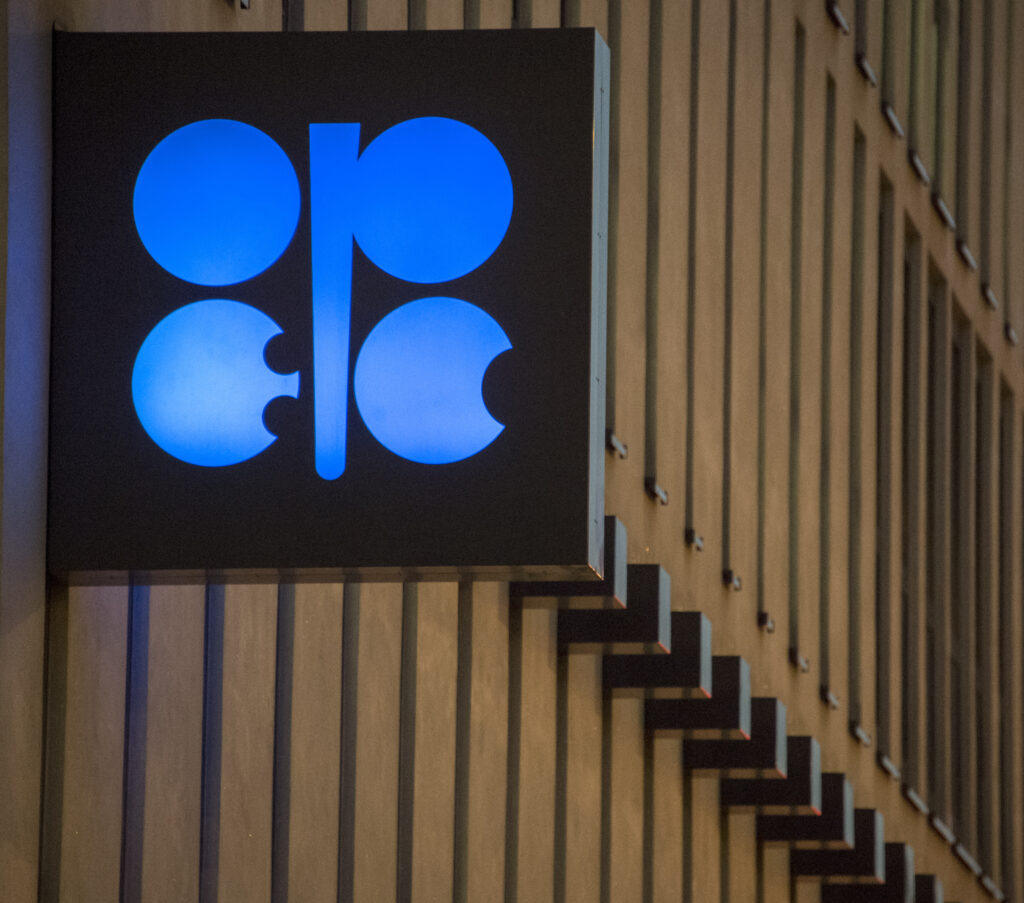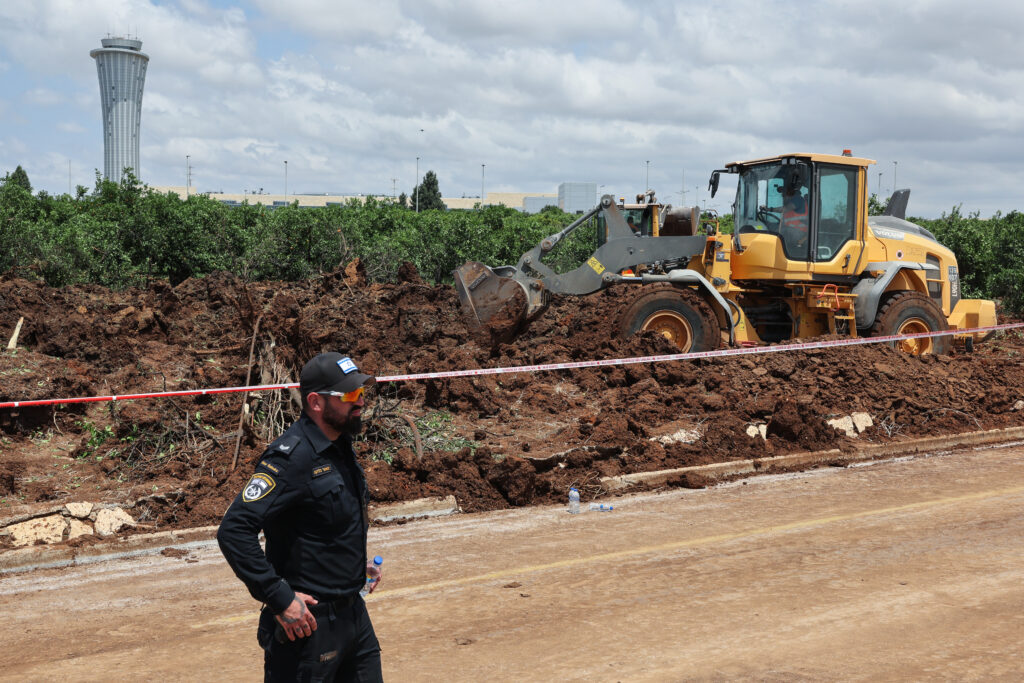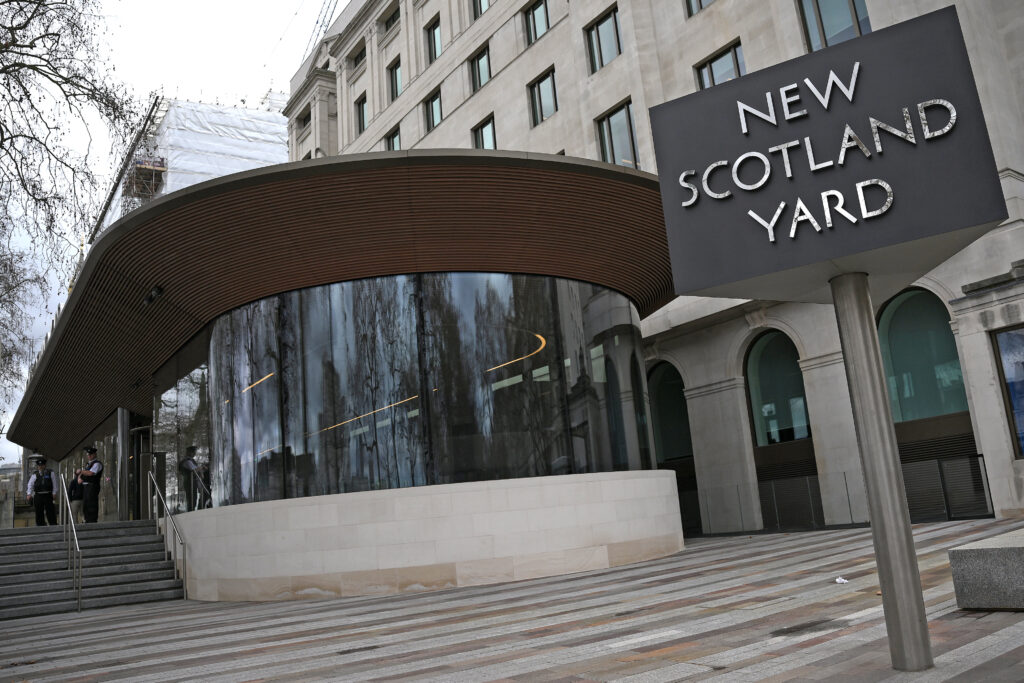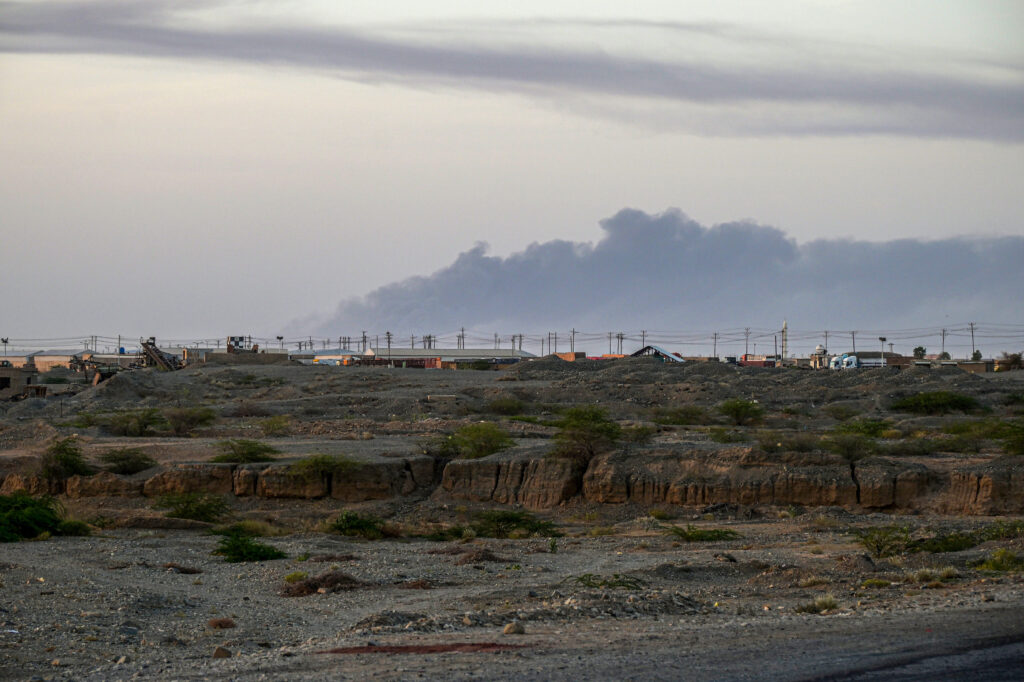AFP Asia Business
‘Bombshell’ OPEC+ output hike hits oil price
Oil prices slumped on Monday after eight OPEC+ members announced a sharp increase in production, while Asian stocks treaded water in thin trade with major markets closed.The output increase of 411,000 barrels a day announced by Saudi Arabia, Russia and six other members of the oil cartel on Saturday added to concerns about over-supply.The price …
Huthis report US strikes after Israel vows revenge for airport attack
Yemen’s Huthi rebels on Monday blamed Washington for around 10 strikes in and around the capital Sanaa after a missile fired by the Iran-backed group struck the area of Israel’s main airport.The Huthi-run Saba news agency said the strikes included two targeting Arbaeen street in the capital as well as one on the airport road, blaming them on “American aggression”.The rebels’ health ministry said 14 people were wounded in the Sawan neighbourhood, according to Saba.The Huthis, who control swathes of Yemen, have launched missiles and drones targeting Israel and Red Sea shipping throughout the Gaza war, saying they act in solidarity with Palestinians.The missile fired from Yemen by the Huthis landed near the main terminal of Tel Aviv’s Ben Gurion Airport on Sunday, wounding six people.The military confirmed that the attack, which gouged a large crater in the perimeter of the airport, had struck despite “several attempts… to intercept the missile”.In a video published on Telegram, Israeli Prime Minister Benjamin Netanyahu said Israel had in the past “acted against” the Iran-backed rebels and “will act in the future”.”It will not happen in one bang, but there will be many bangs,” he added, without elaborating. Later on X, Netanyahu said Israel would also respond to Iran at “a time and place of our choosing”.Several international airlines suspended flights to Israel following the attack, and hours later the Huthis promised more such strikes and warned airlines to cancel their flights to Israeli airports.A police video showed officers standing on the edge of a deep hole in the ground with a control tower visible behind them. No damage was reported to airport infrastructure.An AFP photographer said the missile hit near the parking lots of Terminal 3, the airport’s largest. – ‘Hit them’ -“You can see the area just behind us: a crater was formed here, several dozen metres wide and several dozen metres deep,” central Israel’s police chief, Yair Hezroni, said in the video.”This is the first time” that a missile has directly struck inside the airport perimeter, an Israeli military spokesperson told AFP.The Huthis claimed responsibility for the attack, saying their forces “carried out a military operation targeting Ben Gurion airport” with a “hypersonic ballistic missile”.In a later statement, the group’s military spokesperson Yayha Saree said they would target Israeli airports, “particularly the one in Lod, called Ben Gurion”, near Tel Aviv. He called on airlines to cancel flights to Israeli airports.Israel’s Magen David Adom emergency service said it had treated at least six people with light to moderate injuries.An AFP journalist inside the airport during the attack said he heard a “loud bang” at around 9:35 am (0635 GMT), adding that the “reverberation was very strong”.”Security staff immediately asked hundreds of passengers to take shelter, some in bunkers,” the AFP journalist said.- ‘Panic’ -One passenger said the attack, which came shortly after air raid sirens sounded across parts of Israel, caused “panic”.”It is crazy to say but since October 7 we are used to this,” said the 50-year-old, who did not want to be named, referring to the 2023 Hamas attack on Israel that sparked the Gaza war.Flights resumed after being halted briefly, with the aviation authority saying Ben Gurion was now “open and operational”.Soon after a government official said Israel’s security cabinet was to meet on Sunday, army chief Lieutenant General Eyal Zamir confirmed media reports of a planned expansion of the Gaza war.”This week we are issuing tens of thousands of orders to our reservists to intensify and expand our operation in Gaza,” Zamir said in a statement.The army would destroy all Hamas infrastructure, “both on the surface and underground”, he added.The Huthis, who control swathes of Yemen, have launched missiles and drones targeting Israel and Red Sea shipping throughout the Gaza war.US strikes on the rebels began under former president Joe Biden, but have intensified under his successor Donald Trump.Israel resumed major operations across Gaza on March 18 amid a deadlock over how to proceed with a two-month ceasefire that had largely stopped the war.
UK police arrest seven Iranians in terrorism probes
British police said Sunday that they had arrested eight people, including seven Iranian nationals, on suspicion of “terrorism offences.” Britain’s interior minister Yvette Cooper described the arrests, which come amid heightened concerns about Iranian activities on UK soil, as two major operations.In one operation, five men — four of them Iranian — were arrested on suspicion of “preparation of a terrorist act”, London’s Metropolitan police said in a statement.The arrests were carried out in London, Swindon and the Greater Manchester area on suspicion of “terrorism offences”. “These were two major operations that reflect some of the biggest counter state threat and counter terrorism operations that we have seen in recent years,” Cooper said.The Daily Telegraph newspaper reported that the authorities felt they had been dealing with an imminent attack.Police said the men, aged between 29 and 46, had been detained by counter terrorism officers on Saturday in relation to “a suspected plot to target a specific premises” — not identified in the statement.The four Iranian men were arrested under the Terrorism Act, while the fifth man, whose nationality was still being established, was detained under the Police and Criminal Evidence Act.”This is a fast-moving investigation and we are working closely with those at the affected site to keep them updated,” said Metropolitan Police counter-terrorism chief Dominic Murphy.”The investigation is still in its early stages and we are exploring various lines of enquiry to establish any potential motivation as well as to identify whether there may be any further risk to the public linked to this matter,” he added.- ‘Serious events’ -Three other men, all Iranian nationals, were arrested in London in a separate counter terrorism police operation on Saturday.The men, aged 39, 44 and 55, were arrested under the National Security Act — which gives law enforcement greater powers to disrupt “state threats” including foreign interference and espionage.The Met police confirmed that the three London arrests “are not connected to the arrest of five people yesterday”.Cooper thanked the police in a statement earlier Sunday.”These are serious events that demonstrate the ongoing requirement to adapt our response to national security threats,” Cooper told the PA news agency.”The government continues to work with police and intelligence agencies to support all the action and security assessments that are needed to keep the country safe.”In March, Iran became the first country to be placed on an enhanced tier of the Foreign Influence Registration Scheme, which aims to boost the UK’s national security against covert foreign influences.The measures, due to come into place later this year, will mean that all persons working inside the UK for Iran, its intelligence services or the Revolutionary Guard would have to register or face jail.Last October, the head of Britain’s MI5 domestic intelligence service revealed that since 2022 the UK had uncovered 20 Iran-backed plots posing “potentially lethal threats”.
Israel vows retaliation against Iran, Yemen’s Huthis over airport attack
Israeli Prime Minister Benjamin Netanyahu vowed Sunday a response to Yemen’s Huthis and their Iranian backers after the rebels struck the area of Israel’s main airport, wounding six people.The strike came hours before Israel’s army confirmed the call-up of “tens of thousands” of reservists to expand the 19-month war in Gaza against the Palestinian militants Hamas.Several international airlines suspended flights to Israel, and hours after the strike Yemen’s Huthis promised more such strikes and warned airlines to cancel their flights to Israeli airports.The military confirmed that the attack, which gouged a large crater in the perimeter of Tel Aviv’s Ben Gurion Airport, was launched from Yemen and had struck despite “several attempts… to intercept the missile”.In a video published on Telegram, Netanyahu said Israel had “acted against” the Iran-backed rebels in the past and “will act in the future”.”It will not happen in one bang, but there will be many bangs,” he added, without elaborating. Later on X, Netanyahu said Israel would also respond to Iran at “a time and place of our choosing”.A police video showed officers standing on the edge of a deep hole in the ground with a control tower visible behind them. No damage was reported to airport infrastructure.An AFP photographer said the missile hit near the parking lots of Terminal 3, the airport’s largest. – ‘Hit them’ -“You can see the area just behind us: a crater was formed here, several dozen metres wide and several dozen metres deep,” central Israel’s police chief, Yair Hezroni, said in the video.”This is the first time” that a missile has directly struck inside the airport perimeter, an Israeli military spokesperson told AFP.The Huthis, who say they act in support of Palestinians in war-ravaged Gaza, claimed responsibility for the attack.The rebels said their forces “carried out a military operation targeting Ben Gurion airport” with a “hypersonic ballistic missile”.In a later statement, the group’s military spokesperson Yayha Saree said they would target Israeli airports, “particularly the one in Lod, called Ben Gurion”, near Tel Aviv. He called on airlines to cancel flights to Israeli airports.Israel’s Magen David Adom emergency service said it had treated at least six people with light to moderate injuries.An AFP journalist inside the airport during the attack said he heard a “loud bang” at around 9:35 am (0635 GMT), adding that the “reverberation was very strong”.”Security staff immediately asked hundreds of passengers to take shelter, some in bunkers,” the AFP journalist said.- ‘Panic’ -One passenger said the attack, which came shortly after air raid sirens sounded across parts of Israel, caused “panic”.”It is crazy to say but since October 7 we are used to this,” said the 50-year-old, who did not want to be named, referring to the 2023 Hamas attack on Israel that sparked the Gaza war.Flights resumed after being halted briefly, with the aviation authority saying Ben Gurion was now “open and operational”.Soon after a government official said Israel’s security cabinet was to meet on Sunday, army chief Lieutenant General Eyal Zamir confirmed media reports of a planned expansion of the Gaza war.”This week we are issuing tens of thousands of orders to our reservists to intensify and expand our operation in Gaza,” Zamir said in a statement.The army would destroy all Hamas infrastructure, “both on the surface and underground”, he added.The Huthis, who control swathes of Yemen, have launched missiles and drones targeting Israel and Red Sea shipping throughout the Gaza war.Israel resumed major operations across Gaza on March 18 amid a deadlock over how to proceed with a two-month ceasefire that had largely stopped the war.
Paramilitaries attack Port Sudan for first time: army
Sudanese paramilitaries on Sunday struck Port Sudan, the army said, in the first attack on the seat of the army-aligned government during the country’s two-year war.The Rapid Support Forces (RSF), battling the regular army since April 2023, have increasingly used drones since losing territory including much of Khartoum in March.Army spokesman Nabil Abdallah said in a statement the RSF “targeted Osman Digna Air Base, a goods warehouse and some civilian facilities in the city of Port Sudan with suicide drones”.He reported no casualties and “limited damage”.Red Sea Military Region Commander Mahjoub Bushra told Sudan’s news agency SUNA the assault lasted three and a half hours and involved 11 drones.AFP images showed smoke above the airport area, about 650 kilometres (400 miles) from the nearest known RSF positions on Khartoum’s outskirts.Later Sunday, an AFP correspondent reported anti-aircraft fire intercepting another drone headed for an air base west of the Red Sea coastal city.In the eastern border town of Kassala near Eritrea, some 500 kilometres south of Port Sudan, witnesses said three drones hit the airport a day after another drone targeted the same site for the first time.Farther south in North Kordofan capital of El-Obeid, residents also reported drones overhead, followed by explosions and plumes of smoke.In February, the army broke a nearly two-year paramilitary siege of El-Obeid, a key link to the vast western Darfur region which is under near-total RSF control.At dawn Sunday, an AFP correspondent in Port Sudan said his home about 20 kilometres from the airport shook as explosions were heard.The airport, a critical hub since the war began, closed temporarily but resumed operations at 5:00 pm (1500 GMT), a Civil Aviation Authority statement said.- Drone warfare -The paramilitaries led by Mohamed Hamdan Daglo are battling the regular army, headed by Sudan’s de facto leader Abdel Fattah al-Burhan, in a devastating war that has killed tens of thousands and uprooted 13 million.In the conflict’s early days, the government relocated from Khartoum to Port Sudan, which until Sunday had been spared the violence.UN agencies have also moved their operations to Port Sudan, where hundreds of thousands of displaced people have sought refuge.The conflict has left Africa’s third largest country effectively divided.The army controls the centre, east and north, while the RSF has conquered nearly all of Darfur and parts of the south.Lacking the army’s fighter jets, the RSF has relied on drones for air power.Sudanese analyst Hamid Khalafallah said the RSF has increasingly relied on long-range drones after the “strategic setback of losing Khartoum”.”Without changing their strategy, they risk being confined to Darfur,” he told AFP.Khalafallah said drones help the RSF “create panic and destabilise” northern and eastern cities such as Port Sudan.- ‘No safe place’ -Sudan’s government has accused the United Arab Emirates of supplying the paramilitaries with advanced drones.The UAE has long denied reports from UN experts, US politicians and international organisations that it provided support to the RSF.Satellite imagery analysed by Yale University’s Humanitarian Research Lab, which tracks the conflict, shows six advanced drones at the RSF-controlled Nyala Airport in Darfur.In an April report, it said the Chinese-made drones “may be capable of long-range surveillance and strikes”.Saudi Arabia, which previously mediated truce talks, Sunday condemned RSF attacks “on vital facilities and infrastructure in Port Sudan and Kassala”.Egypt said the attacks undermine “efforts to restore stability” in the war-torn country.Sunday’s was the latest RSF drone attack on military and civilian infrastructure deep in army-held territory.A retired Sudanese army general told AFP on condition of anonymity such attacks “serve to send a message” that “there is no safe place” for the RSF’s rivals.”Their other objective is to halt air traffic,” he said, and to “impact the armed forces’ supply chain”.
Malta offers to repair Gaza aid ship in drone strike row
Malta offered on Sunday to repair an aid ship and send it on its way to Gaza after pro-Palestinian activists said the vessel had been hit by a drone strike.But Prime Minister Robert Abela said the Freedom Flotilla Coalition must first allow a maritime surveyor on board to inspect the “Conscience” and determine what repairs are needed.The pro-Palestinian activists had pointed the finger at Israel, which has blockaded the Gaza Strip throughout its military campaign against Hamas, for the attack.If the ship can be fixed at sea, it will be, but otherwise it will be towed under Maltese control to the Mediterranean island for repairs, paid for by Malta.”In the last few hours there was insistence that first the boat comes into Maltese waters and then the surveyor is allowed onboard,” Abela said.”Before a vessel — any vessel — is allowed to enter Maltese waters then control must be in the hands of Maltese authorities, especially when we are talking about a vessel with no flag, no insurance.”In an online press conference, members of the coalition who had been due to board the Conscience in Malta — including Swedish activist Greta Thunberg — said they had agreed to allow the inspection.”When we received this offer from the Maltese government, we consulted with all of our Flotilla Coalition committee members who are on board,” said Brazilian FFC volunteer Thiago Avila.”And their decision is that this is a good proposition from the Maltese government,” he said.”As long as they can guarantee … Conscience will not be stopped when it wants to leave on the humanitarian mission to take aid to Gaza.”- Low altitude sweeps -The activists explained the Conscience has no flag because the government of the Pacific nation of Palau had announced that they were withdrawing their registration on Friday, the day of the alleged strike.Otherwise, they insisted they had made every effort to comply with international maritime law when embarking on the mission to take aid to Palestinians in Gaza.According to the Flotilla Coalition, the Conscience was attacked in international waters as it headed for Malta on Friday, causing a fire that disabled the vessel and minor injuries to crew members.Maltese and Cypriot rescuers responded. No government has confirmed the Conscience was the victim of drones, but Cyprus’s rescue agency said it had been informed by the island’s foreign ministry of an Israeli strike.The Israeli military did not provide an immediate response when contacted by AFP.First reported by CNN, a flight tracking service showed that an Israeli C-130 military cargo plane had been in the area immediately before the incident and had made several low altitude sweeps over the area.Israel is known for conducting covert operations beyond its borders, including several during the Gaza war that it only acknowledged later.The activists said the strike appeared to target the boat’s generator.Thunberg told reporters that the incident should not distract from the focus of the boat’s mission to Gaza.”What we are doing here is to try our very best to use all the means that we have to do our part, to keep trying to break the inhumane and illegal siege on Gaza and to open up humanitarian corridors,” she said.





